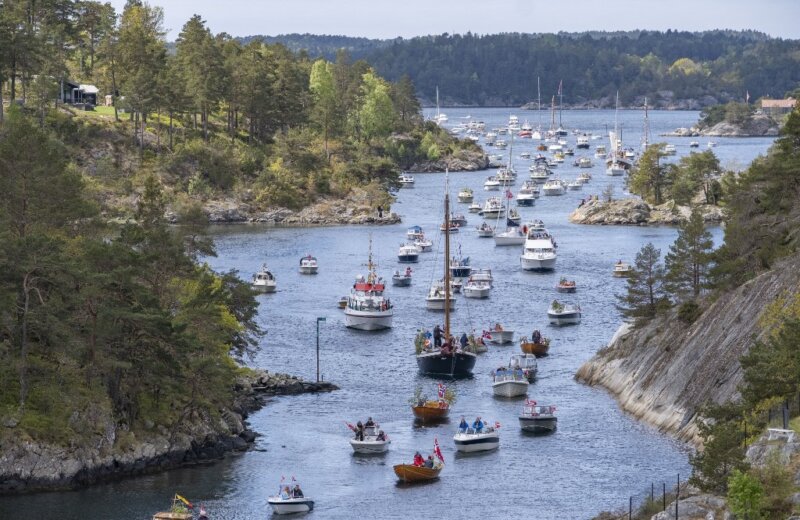A struggling green energy market, a population with a knack for information technology and consumers who love seafood are three factors that should make Ukraine an ideal investment climate for Norway.
Currently, there are currently 60 Norwegian businesses registered with the Norwegian-Ukrainian Chamber of Commerce (NUCC) operating in Ukraine. These businesses mainly provide goods and services in energy, seafood, and IT.
According to NUCC, business between the two countries has been increasingly rapidly since 2015. Trade has risen in part due a joint declaration signed in January 2019 to increase cooperation in the energy sector. That year, Norwegian investments from businesses totaled $483 million (4 billion kroner)—a 135% increase from the year before, according to NUCC.
However, the state, facing a recession caused by the pandemic, doesn’t have enough money to buy the green energy it promised to acquire from investors. As a result, the state has amassed a $1 billion debt to green energy developers.
The conflict hurt Ukraine’s reputation among potential investors, Kjartan Tveitnes, managing director at NUCC, told the Kyiv Post. “It’s very bad for other investors sitting on the fence and considering going to Ukraine,” he said. “From a Norwegian perspective, corruption is a clear no-go.”
Promising growth slowed down by the pandemic and Ukraine’s inconsistent energy policy is deterring many foreign investors in renewables. Nonetheless, the relationship continues to grow as Norwegian investors find further areas of investment.
Trust issues
Norway accounted for 19% of foreign direct investment in Ukraine’s renewable energy last year, making it a major investor in green energy in Ukraine.
Companies such as Scatec Solar and Norsk for solar energy or NBT in the wind sector have already invested hundreds of millions of dollars in various projects across the country, but endless government changes challenge investors to stay, Tveitnes said.
“They are still there and want to look forward but they have to be able to trust changing governments,” he said.
Norwegian businesses should pressure the Ukrainian government to respect the contracts it signed and to bring the country on a path of good governance practices, no matter who’s at its head.
“We should support Ukraine in its development but also put pressure on it in cases like those in the renewable energy sector where things are clearly not okay,” he said.
But recent changes in the Energy Ministry’s leadership are unlikely to foster trust among Norway’s entrepreneurs.
In April 2021, parliament confirmed Herman Halushchenko as the country’s new energy minister. Halushchenko is the former vice president of Ukraine’s state nuclear giant Energoatom.
Experts raised concerns about the nomination. Under Halushchenko, Energoatom sold cheap electricity at knock-down prices to companies associated with oligarchs including Akhmetov and Ihor Kolomoisky.
Expert partner
On the bright side, Norwegian Petroleum Geo-Services (PGS), which offers seismic services that help oil companies to find oil and gas reserves offshore worldwide, will soon start 3D seismic exploration in the Black Sea alongside Naftogaz.
Talks about exploiting the Black Sea shelf have been ongoing since 2012 when estimates revealed that Ukraine’s deep territorial waters may contain more than 2 trillion cubic meters of gas.
Shortly thereafter, Russia stole most of Ukraine’s offshore oil and gas deposits when it annexed Crimea in 2014, extending its control into Ukrainian territorial waters.
As a result, Ukraine lags behind other Black Sea nations in extracting its potentially rich offshore gas deposits. Naftogaz’ partnership with PGS could boost both countries’ economies, Tveitnes said.
“If they find gas, the Norwegian industry is well-positioned to help Ukraine,” he said.
Seafood giant
Norway’s strong suit lies in the sea and Ukraine is a very large market for Norwegian seafood, forming close to 80% of all Norwegian exports to Ukraine, Tveitnes said.
“If you buy fish in a supermarket, there’s a high probability it comes from Norway,” he said.
As the spending power in Ukraine increases, locals are opting for healthier food, which includes Norwegian salmon, he said.
Norway’s seafood industry could also boost Ukraine’s agricultural sector.
The Scandinavian country needs a lot of fish feed to sustain its 450 million fish. Fish feeding ailments account for roughly 70% of Norway’s imported agricultural product, a good opportunity for Ukraine’s development in the country.
This business niche could be a game-changer for both industries, according to him.
Overall, it’s impossible to compete with China in volume, Tveitnes said, but if Ukrainian businesses find the niche where they can compete, they can offer the ‘Made in Europe’ label that Norwegian customers will choose over the Chinese one.
“There’s a huge market in Norway for Ukraine in this sector,” he said. “Our human food market is small, but our animal feed market is massive.”



